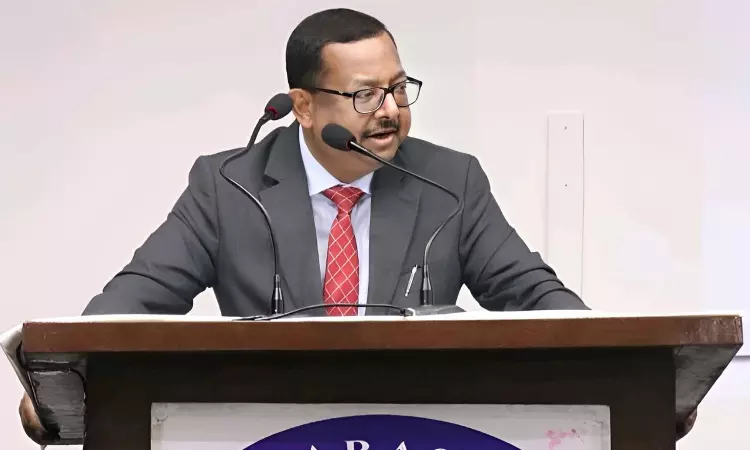Justice Ujjal Bhuyan Advocates For Rights-Based Approach To AI Regulation At National Symposium Hosted By MNLU Mumbai
LIVELAW NEWS NETWORK
8 April 2025 10:05 PM IST

Justice Ujjal Bhuyan, Judge, Supreme Court India emphatically argued for an acknowledgment of the repercussions that Artificial Intelligence (AI) could have on the legal system, especially in terms of data privacy, security and Intellectual Property Rights (IPR).
Justice Bhuyan was speaking at the National Symposium on AI: Privacy, Security and IPR, organized by Maharashtra National Law University Mumbai in association with its Centre for Information Communication Technology & Law (CICTL), and the Centre for Advanced Legal Studies, Training & Research (CALSTAR).
In his discourse, Justice Bhuyan emphasised that each of these subjects was capable of a standalone debate which greatly encapsulated the impact of all the four themes. He elaborated on privacy that it should not be viewed through an isolated notion but rather through the lens of rights-based jurisprudence. Interestingly, he opined that the concept of privacy drew sustenance from the maxim – 'every man's house is his castle'. Drawing from the observations of prominent jurists like Justice R.F. Nariman who referred to Gary Bostwick's conceptual understanding of privacy as encompassing 'repose, sanctuary, and intimate decision, classified privacy into three distinct aspects: Protection against state intrusion in to the physical body, safeguarding personal information from unauthorized use, and preserving the ability to make fundamental personal choices without external interference. This reinforced the comprehensive nature of privacy as a fundamental right. However, he also made a distinction with non-state elements and pointed out that due to pervasive data generation – AI systems could easily dig through this data and use it for their functioning indiscriminately.
He enlightened the audience by tracing the evolution of the right to privacy in India, through a range of legal cases including the case of MP Sharma v. Satish Chandra, A.K. Gopalan v. Union of India, Maneka Gandhi v. Union of India, People's Union for Civil Liberties v. Union of India, and Justice K.S. Puttaswamy (Retd.) v. Union of India, among others. Thereby, he emphasised that privacy is now considered a fundamental element of human dignity and an inalienable right. However, he pointed out that even the right to know cannot be ignored.
“India is a liberal democracy governed by law – wherein on one hand – there is the right to privacy which must be protected and on the other hand – there is the right to know which also could not be disregarded. This right to know is a potent weapon in the hands of citizens within the broader framework of democracy,” Justice Bhuyan said.
Parallel to the evolution of privacy rights, he also discussed the concept of data security and the recent advancements both in legal frameworks and schemes.
Further Justice Bhuyan addressed the Intellectual Property Rights. He reiterated CJI Anand's statement of 1997 that “unlike physical property, IP cannot be easily secured in a deposit box or bank vault”. It was precisely this inherent vulnerability that made it prone to strategic exploitation. He pointed out that especially with the rapid rise of AI and AI-generated innovations, there is a crucial need for policymakers and deliberators to create an adequate framework to protect the products of human mind.
In his concluding remarks, he observed that AI may not have achieved the full capacity to be incorporated into the judiciary yet.
“AI Judges have often been talked about. Can these give justice? Judges and lawyers cannot be driven by AI in 95% of the cases. When we are dealing with natural persons, the dignity of humans is paramount and must be respected. Individual autonomy must be protected,” Justice Bhuyan underscored.
Advocate General of Maharashtra, Sr. Adv. (Dr.) Birendra Saraf was also present at the symposium and delivered a special address.
The event can be viewed here.


